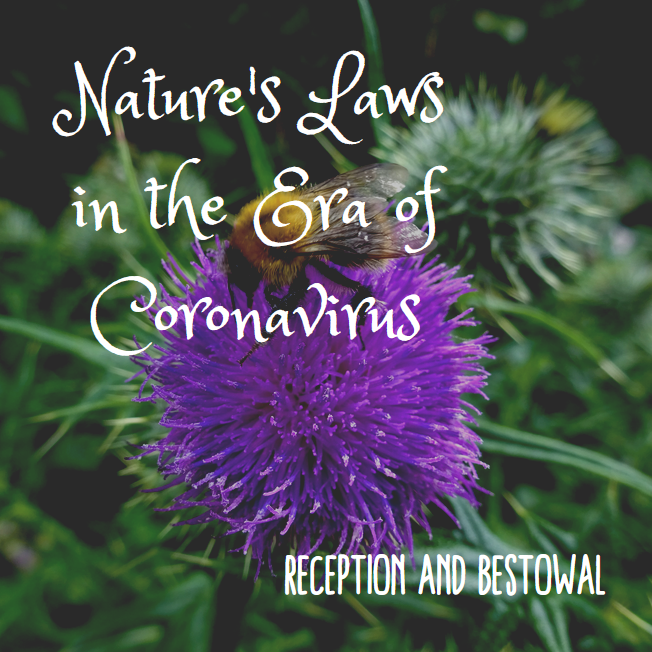
There is an elegant and fascinating wisdom called Kabbalah that offers a view of the two forces called reception and bestowal that has wormed its way inside my heart. I’m going to share it with you because it provides an interesting and edifying explanation of these two basic governing forces.
Nature’s purpose is to bestow—to provide us with everything we need. In order to express her essence, she manifested a receptacle to which to give—a “vessel” of pure reception, the opposite of her altruistic nature. This action established the powers in the universe that manage everything and precipitated the process that began the evolution of all that is on earth—bestowal and reception.
The exquisitely fine energy of Nature underwent four phases of development at the end of which it became so coarse that matter appeared, in the form of that initial tiny spark that grew into our expansive universe. The cycle of giving and receiving operates within every level of nature, meaning that each of us is obliged to receive our needs from society and must in turn benefit society through our work for its well-being.
Our state as humans is that we live inside the force of reception or desire, often called the will to receive. There is no motion or action without first having a desire for it and that desire is always for personal fulfillment. I’m aware of the discomfort of my nose itching and I want it to stop (desire). I know that scratching it will bring relief (thought). I scratch. We move through life following this sequence repeatedly and relentlessly. We are programmed to seek pleasure and avoid pain.
Bestowal or giving, also called the will to bestow, is another state entirely. It is called light because it exists in that realm of the higher purpose of nature—to give us pleasure and abundance. The light shines freely with no self-benefit attached, because nature needs nothing from us. It only bestows.
There are four interactions between the forces of reception and bestowal.
- Receiving in order to receive—this is the stage of the fetus and of infancy. The only action possible is to receive.
- Bestowing in order to receive—a selfish state and one that can be dangerous. We see this in our world today, actions that look like giving, but are done only to fulfill the giver’s egoistic desires.
- Bestowing in order to bestow—learning what another needs and providing it. This stage is practice, so to speak, for the final stage toward which we aim.
- Receiving in order to bestow—fulfilling a desire only when some of the fulfillment is directed toward the common good.
The squalling newborn can only receive. As he grows and gains awareness of the world around him, he enters into relationships with his parents and learns that pleasing them elicits an enjoyable response. He undergoes education and learns that others have needs that he can fulfill. Eventually, if he pursues his full and expanded development, he is able to receive only in order to bestow. When this development is attained collectively, we will create among us a society based on mutual guarantee.
Let’s say that I interact in a group of ten people and my actions are all directed to caring for the other nine. If they are all doing the same, nine others are caring for me. I don’t even have to think about myself! My pleasure is constantly derived from my efforts toward them because of the great benefit I ultimately receive. This state is called mutual guarantee.
Nature has visited COVID-19 upon us out of the glaring violation of this law by a global society that greedily receives without providing the balancing force of giving. Such imbalances unleash elements of Nature that otherwise would be in their proper place, living quietly, undetected.
I came across this lovely passage from the writings of Kahlil Gibran.
And now you ask in your heart, ‘How shall we distinguish that which is good in pleasure from that which is not good?’
Go to your fields and your gardens, and you shall learn that it is the pleasure of the bee to gather honey of the flower,
But it is also the pleasure of the flower to yield its honey to the bee.
For to the bee a flower is a fountain of life,
And to the flower a bee is a messenger of love,
And to both, bee and flower, the giving and the receiving of pleasure is a need and an ecstasy.
His lovely words speak to the idea that through mutual giving and receiving we find immeasurable pleasure in our lives. If we look closely we can see examples of this in the nature around us, such as the bee and the flower. By participating in the cycle of giving and receiving, we discover our highest selves.

